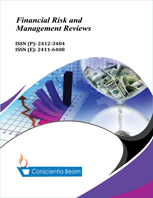Does Managerial Emotional Biases Affect Debt Maturity Preference? Bayesian Network Method: Evidence from Tunisia
DOI:
https://doi.org/10.18488/journal.89/2016.2.1/89.1.1.25Abstract
This study documents that managerial characteristics’ play an important role in determining corporate debt maturity. Specifically, we focus on the relationship between the managerial biases and firm debt maturity preference. Empirical analysis of the relationship between emotional bias and debt maturity using Bayesian Network Method. We distributed a questionnaire among 100 Tunisian managers to measure their emotional biases. Our results have revealed that the behavioral analysis of debt maturity preference implies leader affected by behavioral biases (optimism, loss aversion, and overconfidence) presence prefer long term debt maturity allowing this protect against the takeover operation Russianness.
Keywords:
Emotional biases, Debt maturity, Behavioral corporate finance, Bayesian network, Managerial characteristicsAbstract Video
Published
2016-10-07
How to Cite
Ali, A. M. ., & Anis, J. . (2016). Does Managerial Emotional Biases Affect Debt Maturity Preference? Bayesian Network Method: Evidence from Tunisia. Financial Risk and Management Reviews, 2(1), 1–25. https://doi.org/10.18488/journal.89/2016.2.1/89.1.1.25
Issue
Section
Articles

